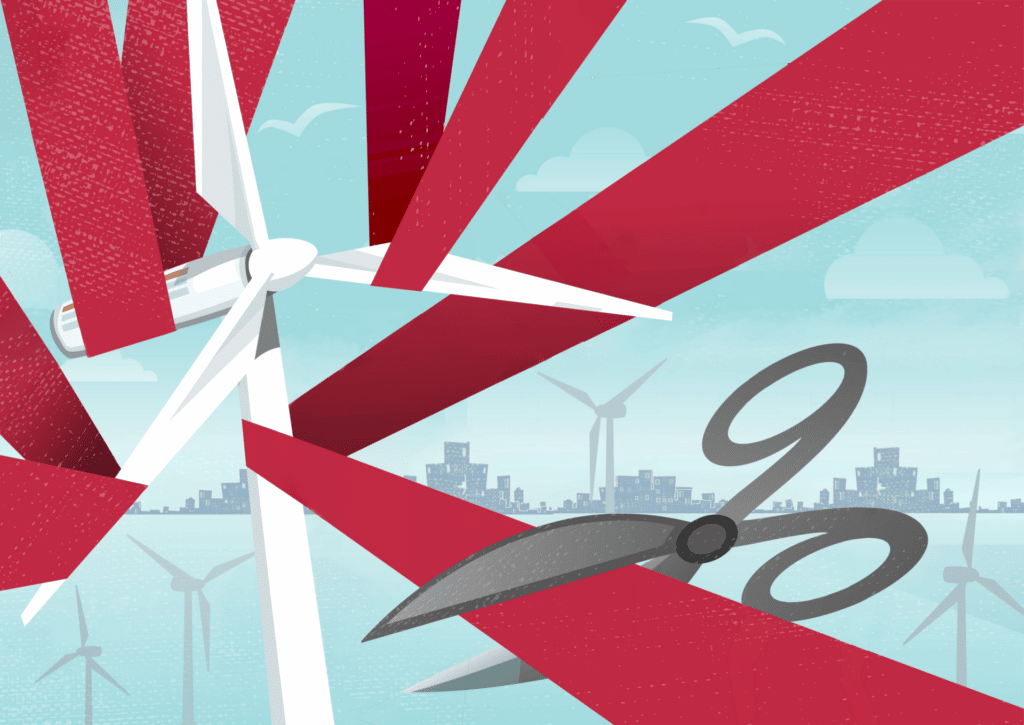Cutting the red tape for cleaner energy: The pros and cons of permitting reform
By Jessica McKenzie | February 1, 2023
 Illustration by Thomas Gaulkin / Jorgen McLeman / Shutterstock
Illustration by Thomas Gaulkin / Jorgen McLeman / Shutterstock
Last year permitting reform emerged as one of the most divisive climate policy debates in the United States. During my own reporting on geothermal energy, an underutilized source of renewable power, industry representatives insisted that the onerous permitting process is the single biggest challenge to expanding geothermal development. A joint industry and Energy Department report on geothermal energy estimated that streamlining the permitting process could more than double the amount of installed geothermal electricity generation by 2050, compared to “business as usual” scenarios.
Permitting-reform advocates say that kind of positive effect holds true for renewable power in general, and that cutting through the bureaucratic red tape around energy and transmission projects is essential to reaching the Biden administration’s goal of permitting 25 gigawatts or more of wind, solar, and other renewable energy projects on federal land by 2025. But many fear that permitting reform will undermine environmental laws that were enacted to protect the country’s natural and cultural resources and reduce needed regulation of fossil fuel projects. Is permitting reform worth the risk to meet the country’s ambitious climate goals, or can other solutions hasten renewable energy development but leave the country’s bedrock environmental laws intact?
To explore nuances in the permit-reform debate, the Bulletin of the Atomic Scientists solicited commentaries from six experts: Andrew Dessler, director of the Texas Center for Climate Studies at Texas A&M University; Sanjay Patnaik, director of the Center on Regulation and Markets at the Brookings Institution and Rayan Sud, a research assistant with the Center on Regulation and Markets at Brookings; Jessica Lovering, co-founder and executive director of the Good Energy Collective, a nuclear policy research organization; Jamie Pleune, a research fellow with the Wallace Stegner Center for Land, Resources, and the Environment at the University of Utah; and Dustin Mulvaney, an environmental studies professor at San José State University.
Together, we make the world safer.
The Bulletin elevates expert voices above the noise. But as an independent nonprofit organization, our operations depend on the support of readers like you. Help us continue to deliver quality journalism that holds leaders accountable. Your support of our work at any level is important. In return, we promise our coverage will be understandable, influential, vigilant, solution-oriented, and fair-minded. Together we can make a difference.















By Andrew Dessler
Clean energy is the future. Permitting reform is how to get there
By Sanjay Patnaik, Rayan Sud
How to modernize permitting for a low-carbon economy
By Jessica Lovering
The process is what matters
By Jamie Pleune
Get rid of bottlenecks—not environmental reviews
By Dustin Mulvaney
Want clean energy, fast? ‘Streamlining’ environmental reviews could have the opposite effect
By Jamie Shinn, Laura Kuhl
What the Mountain Valley Pipeline debacle says about energy permitting reform and ‘just transitions’
By Dustin Mulvaney
Permitting reform is back from the dead. Will lawmakers sacrifice America’s public lands to the fossil fuel industry?